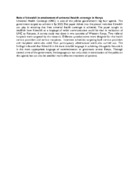| dc.contributor.author | Wamalwa, Erick | |
| dc.contributor.author | Wasike, Misiko | |
| dc.date.accessioned | 2020-03-05T12:39:11Z | |
| dc.date.available | 2020-03-05T12:39:11Z | |
| dc.date.issued | 2019-06-12 | |
| dc.identifier.uri | http://erepository.kibu.ac.ke/handle/123456789/1872 | |
| dc.description.abstract | Universal Health Coverage (UHC) is one of the Jubilee government’s big four agenda. The government targets to achieve it by 2022.This paper delves into the pivotal role that Kiswahili can play in ensuring that free universal health coverage is achieved. The paper sought to establish how Kiswahili as a language of wider communication could be vital in realization of UHC to Kenyans. A survey study was done in two counties of Western Kenya. Two referral hospitals were targeted by the research. Different questionnaires were designed for the health service providers and service recipients. Interview schedules targeting both service providers and recipients were also used. Non participatory observations were also carried out. The findings indicated that Kiswahili is the most suitable language in achieving the agenda because it is the most appropriate language of communication at grassroots across Kenya. Through several arms of the government, the language can not only assist in sensitization of the public on this agenda but can also be used for more effective treatment of patients. | en_US |
| dc.language.iso | en | en_US |
| dc.publisher | KIBU | en_US |
| dc.rights | Attribution-NonCommercial-ShareAlike 3.0 United States | * |
| dc.rights.uri | http://creativecommons.org/licenses/by-nc-sa/3.0/us/ | * |
| dc.subject | Kiswahili | en_US |
| dc.subject | Universal Health Coverage & Communication | en_US |
| dc.title | Role of kiswahili in attainment of universal health coverage in Kenya | en_US |
| dc.type | Article | en_US |

